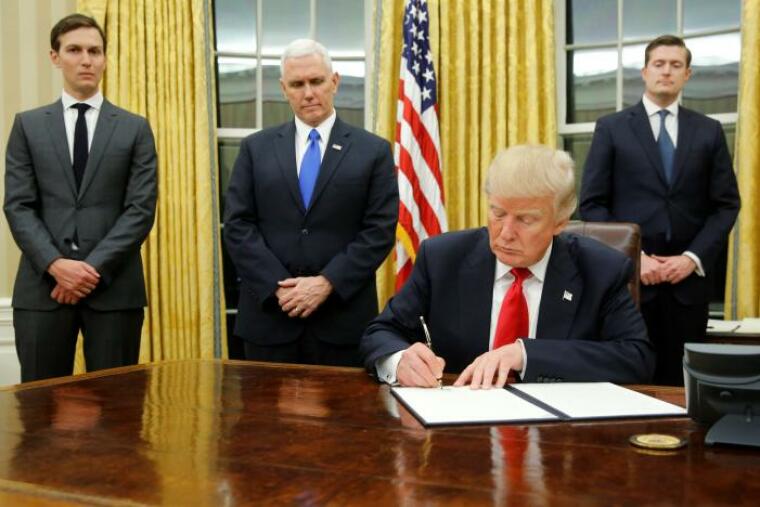Trump reinstates policy that bans funding for promotion of abortions overseas

President Donald Trump has reinstated a policy on Monday that blocks federal funding to nongovernmental organizations that promote abortions overseas.
The order, commonly known as the Mexico City Policy, was first introduced by President Ronald Reagan in 1984 at a United Nations conference in Mexico City. It required nongovernmental organizations receiving U.S. aid to sign agreements that they would not perform abortions.
The policy was blocked when former President Bill Clinton took office in 1993, but it was reinstated under the administration of George W. Bush. Former President Barack Obama rescinded it again on January 23, 2009, three days after his inauguration.
Prior to Obama's repeal, only International Planned Parenthood Federation (IPFF) and Marie Stopes International refused to abide by the policy and were consequently blocked from receiving funds, according to the Baptist Press.
Trump's move was decried by pro-abortion advocates while pro-lifers applauded it.
"This decision will save lives, will encourage the hundreds of thousands of men and women who will march on Washington this week [at the Jan. 27 March for Life] for the rights of unborn children, along with millions more around the country who believe that foreign aid should promote life, not end it," said Russell Moore, president of the Southern Baptist Ethics & Religious Liberty Commission (ERLC).
"This is a welcome step in the right direction, and my hope is that the president will continue to defend human dignity and hold the predatory abortion industry accountable," he added.
Rep. Diane Black commended Trump for "protecting the conscience rights of American taxpayers and prioritizing federal funding for organizations that protect life over those that take it away."
Critics of the order have argued that it would impede women's ability in poor countries to obtain reproductive health services by blocking funds to health clinics that provide a variety of services, including abortion counseling, the New York Times reported.
The IPFF said that its partners in Nepal, Kenya and Ethiopia lost its American funding when the policy was reinstated under the Bush administration. Kelly Castagnaro, a Planned Parenthood spokeswoman, said that the nongovernmental groups in those countries were compelled to close clinics and offer fewer contraceptives because they refused to accept the terms of the policy.
 Christians don't have to affirm transgenderism, but they can’t express that view at work: tribunal
Christians don't have to affirm transgenderism, but they can’t express that view at work: tribunal Archaeology discovery: Medieval Christian prayer beads found on Holy Island
Archaeology discovery: Medieval Christian prayer beads found on Holy Island Presbyterian Church in America votes to leave National Association of Evangelicals
Presbyterian Church in America votes to leave National Association of Evangelicals Over 50 killed in 'vile and satanic' attack at Nigerian church on Pentecost Sunday
Over 50 killed in 'vile and satanic' attack at Nigerian church on Pentecost Sunday Ukrainian Orthodox Church severs ties with Moscow over Patriarch Kirill's support for Putin's war
Ukrainian Orthodox Church severs ties with Moscow over Patriarch Kirill's support for Putin's war Islamic State kills 20 Nigerian Christians as revenge for US airstrike
Islamic State kills 20 Nigerian Christians as revenge for US airstrike Man who served 33 years in prison for murder leads inmates to Christ
Man who served 33 years in prison for murder leads inmates to Christ


 Nigerian student beaten to death, body burned over ‘blasphemous’ WhatsApp message
Nigerian student beaten to death, body burned over ‘blasphemous’ WhatsApp message 'A new low': World reacts after Hong Kong arrests 90-year-old Cardinal Joseph Zen
'A new low': World reacts after Hong Kong arrests 90-year-old Cardinal Joseph Zen Iran sentences Christian man to 10 years in prison for hosting house church worship gathering
Iran sentences Christian man to 10 years in prison for hosting house church worship gathering French Guyana: Pastor shot dead, church set on fire after meeting delegation of Evangelicals
French Guyana: Pastor shot dead, church set on fire after meeting delegation of Evangelicals ‘Talking Jesus’ report finds only 6% of UK adults identify as practicing Christians
‘Talking Jesus’ report finds only 6% of UK adults identify as practicing Christians Mission Eurasia ministry center blown up in Ukraine, hundreds of Bibles destroyed: 'God will provide'
Mission Eurasia ministry center blown up in Ukraine, hundreds of Bibles destroyed: 'God will provide' Church holds service for first time after ISIS desecrated it 8 years ago
Church holds service for first time after ISIS desecrated it 8 years ago Burger King apologizes for 'offensive campaign' using Jesus' words at the Last Supper
Burger King apologizes for 'offensive campaign' using Jesus' words at the Last Supper Uganda: Muslims abduct teacher, burn him inside mosque for praying in Christ’s name
Uganda: Muslims abduct teacher, burn him inside mosque for praying in Christ’s name